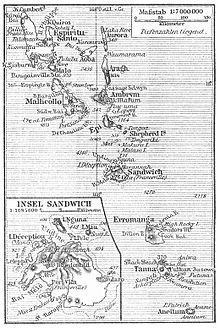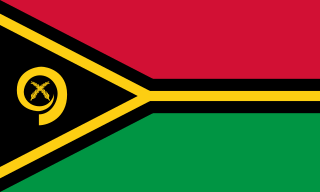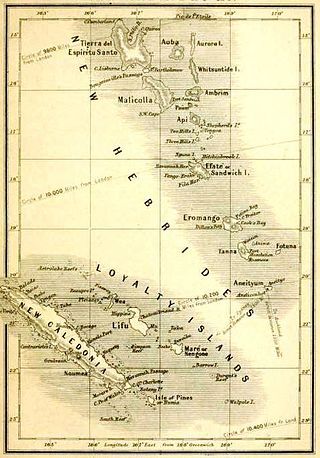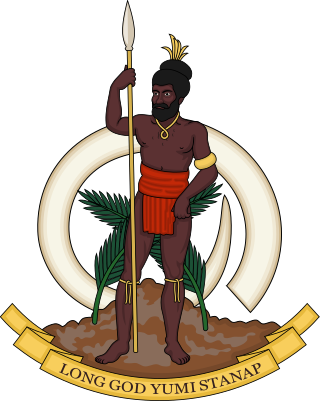
This is a list of the resident commissioners of the New Hebrides, an Anglo-French condominium encompassing the territory of the present-day Republic of Vanuatu, that was divided into two separate communities: one Anglophone and one Francophone. [1]

This is a list of the resident commissioners of the New Hebrides, an Anglo-French condominium encompassing the territory of the present-day Republic of Vanuatu, that was divided into two separate communities: one Anglophone and one Francophone. [1]
|
| |||||||||||||||||||||||||||||||||||||||||||||||||||||||||||||||||||||||||||||||||||||||||||||||||||||||||||||||||||||||||||||||||||||||||||||||||||||||||
For continuation after independence, see: President of Vanuatu

Vanuatu, officially the Republic of Vanuatu, is an island country in Melanesia located in the South Pacific Ocean. The archipelago, which is of volcanic origin, is 1,750 km (1,090 mi) east of northern Australia, 540 km (340 mi) northeast of New Caledonia, east of New Guinea, southeast of Solomon Islands, and west of Fiji.

The history of Vanuatu spans over 3,200 years.

The politics of Vanuatu take place within the framework of a constitutional democracy. The constitution provides for a representative parliamentary system. The head of the Republic is an elected president. The prime minister of Vanuatu is the head of government.

New Hebrides, officially the New Hebrides Condominium and named after the Hebrides in Scotland, was the colonial name for the island group in the South Pacific Ocean that is now Vanuatu. Native people had inhabited the islands for three thousand years before the first Europeans arrived in 1606 from a Spanish expedition led by Portuguese navigator Pedro Fernandes de Queirós. The islands were named by Captain James Cook in 1774 and subsequently colonised by both the British and the French.
The franc was the currency of the Anglo-French Condominium of the Pacific island group of the New Hebrides. It circulated alongside British and later Australian currency. The New Hebrides franc was nominally divided into 100 Centimes, although the smallest denomination was the 1 franc. Between 1945 and 1969, it was part of the CFP franc.

The president of Vanuatu is the head of state of Vanuatu. The president is elected for a five-year term by an electoral college consisting of Parliament and the presidents of the regional councils.

This is a survey of the postage stamps and postal history of Vanuatu, formerly known as the New Hebrides, an island group in the South Pacific. Between 1906 and 1980, the islands were an Anglo-French Condominium.
Sir Robert Sidney Foster was a British colonial administrator, best remembered as the last colonial Governor of Fiji and the first Governor-General of the Dominion of Fiji. He had previously served as Governor of the Solomon Islands and as High Commissioner for the Western Pacific.
Rugby union in Vanuatu, formerly known as the New Hebrides, is a popular sport. Vanuatu is a tier three rugby union playing nation. They began playing international rugby union in 1966 and have yet to make the Rugby World Cup.

Nagriamel is a political party in Vanuatu.

Franceville was a municipality located on Efate, or Sandwich Island. It was established in 1889 in order to gain basic legal status, during the period when the New Hebrides was a neutral territory under the loose jurisdiction of the Anglo-French Joint Naval Commission.

Ati George Sokomanu, is a Vanuatuan politician who served as the first president of Vanuatu from 1984 to 1989.

The French Republic and the Republic of Vanuatu have long-standing bilateral relations which have varied over the years between tense and amicable. Vanuatu, then known as the New Hebrides, was a Franco-British condominium from 1906 to 1980, and maintained formal relations with both of its former colonial masters after gaining independence. Franco–Vanuatuan relations were rocked by a series of crises in the 1980s, and broke down completely on several occasions, with Vanuatu expelling the French ambassador in 1981, in 1984 and in 1987. Relations improved from the 1990s onwards and, today, France provides development aid to Vanuatu. The two countries also share amicable economic and cultural relations; both are members of the Organisation internationale de la Francophonie.
Ratua, situated in the Vanuatu archipelago, is a 146-acre (59 ha) island located south of Espiritu Santo, between Aore and Malo islands.
Jean-Marie Léyé Lenelgau was a Vanuatuan politician and the president of Vanuatu from 2 March 1994 to 2 March 1999.

The Coconut War was a brief clash between Papua New Guinean soldiers and rebels in Espiritu Santo shortly before and after the independence of the Republic of Vanuatu was declared on 30 July 1980.
Law in the Republic of Vanuatu consists of a mixed system combining the legacy of English common law, French civil law and indigenous customary law. The Parliament of Vanuatu is the primary law-making body today, but pre-independence French and British statutes, English common law principles and indigenous custom all enjoy constitutional and judicial recognition to some extent.
Call signs in Oceania are currently voluntary in Australia radio and TV station, and were previously compulsory in New Zealand. In both countries, stations like 2GB and Newstalk ZB continue to use parts of the call signs in their branding.

The Vanuatu Labor Corps was a labor unit of the United States Army and the United States Navy, consisting of New Hebrides natives. The unit was established in 1942 and dissolved in 1945. During its service it provided crucial logistical support to the Allied war effort during the Guadalcanal Campaign. It was jointly led by Major George Riser and Thomas Beatty, while its size fluctuated between 1,000 and 10,000 men.
Vanuatu nationality law is regulated by the 1980 Constitution of Vanuatu, as amended; the 1980 Citizenship Act, and its revisions; and various international agreements to which the country is a signatory. These laws determine who is, or is eligible to be, a national of Vanuatu. Vanuatu nationality is typically obtained under the principle of jus sanguinis, i.e. by birth in Vanuatu or abroad to parents with Vanuatu nationality. It can be granted to persons with an affiliation to the country, or to a permanent resident who has lived in the country for a given period of time through naturalisation. Vanuatu has had several programs that grant honorary citizenship by investment. Nationality establishes one's international legal identity as a member of a sovereign nation. Though it is not synonymous with citizenship, for rights granted under domestic law for domestic purposes, the United Kingdom, and thus the commonwealth, have traditionally used the words interchangeably.